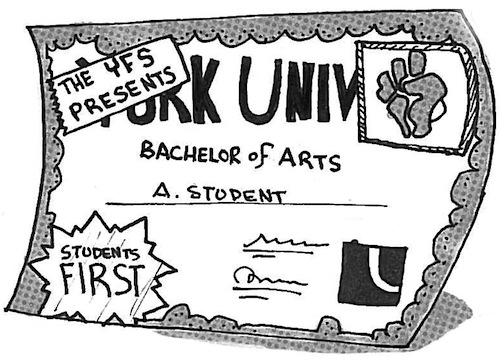 Thinking of taking an extra year to finish your degree? The YFS has your back.
Thinking of taking an extra year to finish your degree? The YFS has your back.
Their plan of implementing a mandatory 6.0-credit women studies or equity class for all degrees will help make that
decision much easier.
Sparked by the recent sexual assaults on campus, the YFS has taken up METRAC’s ingenious recommendation of putting in place a mandatory equity course—because you can never have too many gen-eds.
How advantageous that today’s student government can become tomorrow’s academic advisor.
Comedy aside, what right does the YFS have to tell me what courses are mandatory to complete my degree? Perhaps this would have made sense if students had been consulted on the matter. But I, for one, haven’t been asked if I think a mandatory equity course is a good idea, and the YFS is supposed to be representing me.
I feel I jump through enough hoops in order to satisfy my degree requirements, and I’m sure I’m
not alone.
I understand the idea behind this is to make the York community more informed about social issues and their causes in hopes of preventing them. That, in itself, is a noble cause I support, but this is the wrong approach.
For starters, this punishes the majority of the student body for the acts of a small minority. The people who will absorb the information, and actually take something out of it, are not the people the proposition is geared towards.
The moment you force someone to do something, it removes their drive to do it, regardless of whether or not they were originally opposed to it. It risks depriving someone of the opportunity to come to a conclusion on their own terms.
Additionally, this policy assumes all sex assaults are committed by York students, which isn’t the case. I’m aware the Calumet Residence case involved a York student, but that doesn’t account for all cases.
With the incoming subway extension to York, the percentage of non-community members on campus will dramatically increase, introducing different dangers. Who, then, will the mandatory equity course serve?
The proposal raises a potential to learn and gain a different outlook, but the reasoning behind it fails to effectively address the situation.
In both cases, the new policy is going to affect those who are already abiding by the laws; no bank robbery ever started with,“Oh wait, guys, is everyone’s gun registered?”
Offering self-defence classes, for instance, would be more effective because those who seek the skill will be willing to learn.
While the proposition is still up in the air, I want to stress its potential consequences.
In the meantime, I’ll worry about jumping through hoops to complete my degree.
Sarah Ciantar
Arts Editor

